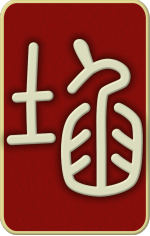
坎 Kǎn Flowing water (Darkness) [hexagram 29]

 Water element
Water element
Mid-Winter (Winter Solstice) ; Host (controlling) line : 5
The Decision
Double darkness (water) maintains sincerity of purpose. Action will be worthwhile.
Double darkness doubles the danger. Water does not accumulate but flows, finding its way through danger without losing its purpose. ‘Maintains sincerity’ – due to the strong center. ‘Action will be worthwhile’ – leading to fulfillment. The heights of Heaven are too dangerous to be climbed; on Earth the hazards are mountains and rivers. Leaders use such hazards to protect their domains; when all is at risk there are important lessons to be learned.
坎: 习坎, 有孚, 维心亨, 行有尚. Kǎn: xíkǎn, yǒu fú, wéi xīn hēng, xíng yǒu shàng.
彖传: 习坎, 重险也. 水流而不盈, 行险而不失其信. 维心亨, 乃以刚中也. 行有尚, 往有功也. 天险不可升也, 地险山川丘陵也, 王公设险以守其国, 坎之时用大矣哉! Tuàn zhuàn: Xí kǎn, chóng xiǎn yě. shuǐ liú ér bù yíng, xíng xiǎn ér bù shī qí xìn. wéi xīn hēng, nǎi yǐ gāng zhōng yě. háng yǒu shàng, wǎng yǒu gōng yě. tiān xiǎn bù kě shēng yě, dì xiǎn shān chuān qiū líng yě, wáng gōng shè xiǎn yǐ shǒu qí guó, kǎn zhī shí yòng dà yǐ zāi!
The Image
The flow is continuous as water is repeated; it is wise to cultivate virtue and instruct others.
象传: 水洊至, 习坎; 君子以常德行, 习教事. Xiàng zhuàn: Shuǐ jiàn zhì, xí kǎn; jūn zǐ yǐ cháng dé xíng, xí jiāo shì.
Line Change 1
Water flowing strongly into a dark cavern. Misfortune.
‘Water flowing strongly into a dark cavern’ – losing the way leads to misfortune.
初六: 习坎, 入于坎窞, 凶. Chū liù: xí kǎn, rù yú kǎn dàn, xiōng.
象传: 习坎入坎, 失道凶也. Xiàng zhuàn: Xí kǎn rù kǎn, shī dào xiōng yě.
Line Change 2
The deep channel is hazardous. Accept modest outcomes.
‘Accept modest outcomes’ – there is no escape from the middle.
九二: 坎有险, 求小得. Jiǔ èr: kǎn yǒu xiǎn, qiú xiǎo dé.
象传: 求小得, 未出中也. Xiàng zhuàn: Qiú xiǎo dé, wèi chū zhōng yě.
Line Change 3
In either direction there is a deep channel. Danger all around. Any action will lead to a fall.
‘In either direction there is a deep channel’ – there is no route to success.
六三: 来之坎坎, 险且枕, 入于坎窞, 勿用. Liù sān: lái zhī kǎn kǎn, xiǎn qiě zhěn, rù yú kǎn dàn, wù yòng.
象传: 来之坎坎, 终无功也. Xiàng zhuàn: Lái zhī kǎn kǎn, zhōng wú gōng yě.
Line Change 4
A bottle of wine and a bowl with some food. A gift handed through a window. Ultimately not a mistake.
‘A bottle of wine and a bowl with some food’ – the meeting of strength and weakness.
六四: 樽酒簋贰, 用缶, 纳约自牖, 终无咎. Liù sì: zūn jiǔ guǐ èr, yòng fǒu, nà yuē zì yǒu, zhōng wú jiù.
象传: 樽酒簋贰, 刚柔际也. Xiàng zhuàn: Zūn jiǔ guǐ èr, gāng róu jì yě.
Line Change 5
The chasm is not yet filled to overflowing but will soon be full to the brim. No blame.
‘The chasm is not yet filled to overflowing’ – the center is not yet sufficiently strong.
九五: 坎不盈, 祗既平, 无咎. Jiǔ wǔ: kǎn bù yíng, zhī jì píng, wú jiù.
象传: 坎不盈, 中未大也. Xiàng zhuàn: Kǎn bù yíng, zhōng wèi dà yě.
Line Change 6
Bound with ropes in a thicket of thorns; three years without finding a way out. Misfortune.
The top line is missing its proper course – misfortune for three years.
上六: 系用徽纆, 寘于丛棘, 三岁不得, 凶. Shàng liù: xì yòng huī mò, zhì yú cóng jí, sān suì bù dé, xiōng.
象传: 上六失道, 凶三岁也. Xiàng zhuàn: Shàng liù shī dào, xiōng sān suì yě.
The full set of 64 English translations is available in our new book 'Book of Changes - Deciphered' ➚.